Price Graphic Arts & Communications | home
Buffalo Soldiers
 Buffalo Soldiers
Buffalo Soldiers 
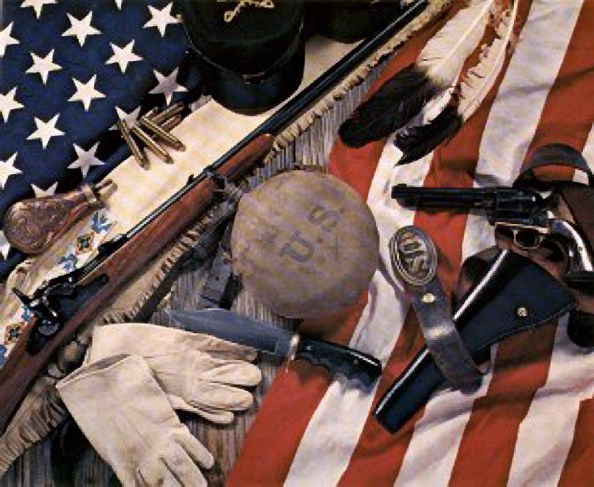 |
Above Photo: Re-Shoot of the Original idea; by Bob Price (equipment Tom Pace & Bob Price Collection)
"We hold these truths to be self-evident, that all men are
created equal, that they are endowed by their Creator with
certain unalienable rights, that among these are life, liberty
and the pursuit of happiness." - The US Declaration of Independence
The Forgotten Regiments
by Bob Price
(From the Amarillo College Magazine; The AC Current 1979
1st Place Sweepstakes Texas Intercollegiate Press Association award for Magazine, 1979
1st Place Texas Intercollegiate Award for Magazine Illustration; Bob Price, 1979
This article appeared in the 1979 AC Current in abbreviated form)
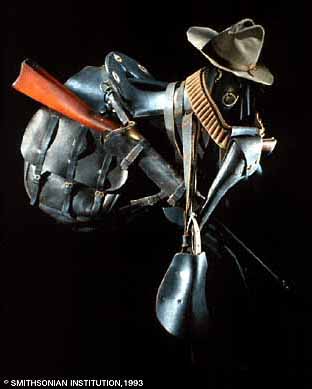 |
American history is a paradox of stories. Or, historical documentation's that may at first seem absurd; but, in fact are true. The history of the Black Soldier in the West is such a story.
Americans for the most part have received their historical education through newspapers, radio, television and the movies. Ask someone to name a popular hero of the West and you will like as not hear the name; John Wayne, or Jimmy Stewart, or Glenn Ford to name a few...
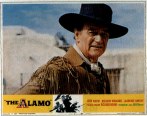
Alamo Movie Poster F.R. Price Collection
Ask Americans what role Blacks played in the settling of the West and you may get a blank stare. Today, because of efforts (which I do not always agree with) to promote Black History; a great deal of research has come forward, which Documents a rich vault of Black investment in American ideals and the preservation of Democracy. There is much more knowledge today in historical research as to what roles the diverse cultures contributed in the settlement of America's Western Territories and trouble areas than was commonly available during the last two centurys.
Common sense would tell us that following the Civil War there was a great flood of Black immigration Westward. Freedmen and their families moved West to enjoy the cheap land and wide open spaces. Many of these men were single solitary figures well adapted to the needs of the West. A great number of them would become 'Cowboys'; they were used to hard labor and well trained in the care of animals, and subsisting on meager rations; and 'living off the land' as most families in the south supplemented their fare by hunting and fishing and were adequate woodsmen of the time.
It is of little wonder then; that the US Government sought to recruit Black men into the ranks of the US Cavalry. The skills needed to win the West resided in the Southern States. As the North was not a major population center for Blacks.
Impressed by the fighting ardor of Black soldiers during the Civil War and a pressing need to establish a sizable force in the West; military leaders turned to Congress for help, requesting that Congress grant the Army permission to allow Blacks into its ranks.
While the Union had opposed 'Open Slavery' it supported the denial of all the rights of free and equal citizenship to Blacks. If Blacks were to serve in the peacetime Army the guidelines must be changed.
Based on the actions of Black troopers during the Civil War the military argued for the establishment of rules that would allow for Black participation in the military services anyway. Union opposition to such a move was based on racial bias; the men who had freed the slaves did not mind Blacks serving; they just did not want to serve with Blacks themselves. Inspite of this prevalent attitude a Pro-Black contingency developed among Civil War Officers who knew full well of the value, the dedication, the ability, the sacrifice and the loyalty of Black Americans in the US Army.
Unlike the South; where the cultures actually merged into a co-existive relationship...in the North Blacks continued to be treated in a stereotypical manner of the times; and the fears of racial prejudices competed with reason.
 The Establishment of Black US Military Units
The Establishment of Black US Military UnitsThe Pro-Black forces prevailed before Congress and on 28 July 1866; Congress passed, "...an act to increase and fix the military peace establishment of the United States..."
This act provided for the establishment of two troops of Black Cavalry, the 9th and 10th; with two troops of Black Infantry; the 24th and 25th. These troops were ordered by the Union to be commanded by White Officers; as no black officers were allowed in the ranks of the Federal Government.
According to the act of Congress; these White Officers were to be; "...men with an active service in the field during the Civil War, distinguished and with a capacity for good conduct..."
The four units of Black military were then established.
 The 9th Cavalry
The 9th CavalryThe 9th Cavalry Regulars like its succeeding units were solicited primarily from the South. The 9th in-particular was recruited from the New Orleans area. The Black troopers did not receive the same care and attention as did their Union brothers.
When the 9th was organized empty Cotton-Presses were used as barracks and the mess hall was an iron kettle over an open campfire. No doubt this was reason enough for the troopers to speculate on their later fate as they faced the hardships of the West without even the basic amenities of civilization afforded many other units.
The goals set for the Black troopers was an awesome undertaking and one wonders if their duty assignments by the Union was not based on some racial motivation. They were given the hardest duty and the most dangerous areas of assignment of any of their Union counterparts.
The 24th and 25th Black Infantry Units kept few records. Their mission though was broad and encompassing; they were established to, '...engage in expeditions against hostile Indians, guard strategic outposts, build and maintain public roadways, establish military posts, erect telegraph lines, perform escort and guard duties, and help to keep the Peace and quiet and Law and Order...'
No other units in the West were so tasked in their military obligations. The Cavalry, likewise, was given areas of responsibilities which modern units would be faint to accept.
The 9th was established to protect Stage Coach Lines, establish Law and Order along the Mexican Borders, and to Confine the Indian Nations to their assigned Reservation and Treaty areas within the 9th's Jurisdiction. That is a tall order by any standard.
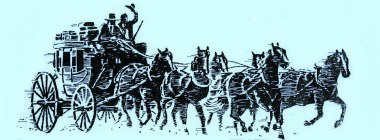
We know the 9th was successful in carrying out its mandates by the public records. Records of their engagements with Bandits, Mexicans and Indians abound. But, very few written records were made concerning their activities. That an interesting history was lost; there is little doubt.
Most of the Cavalry history which has come to light in recent years was the product of the enlisted man and noncommissioned officers in the ranks. There is little indication that many or any of the 9th's all Volunteer Force had any formal education or the ability to read and write. They have left no written record which has been discovered to date.
Much more information is available concerning the 10th Cavalry.
 The 10th Cavalry
The 10th CavalryThe 10th Cavalry at its inception was established as an 'Elite Unit' thanks to the forward and progressive ideas of its Commander Colonel Grierson. Grierson was familiar with the tenacity and determination of Black Soldiers during the Civil War; and, he was determined to fill the ranks of the 10th with men of the highest physical and mental qualities. Orders were issued to bring in none but, "...Superior Men...who would do credit to the Regiment..."
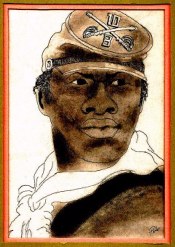
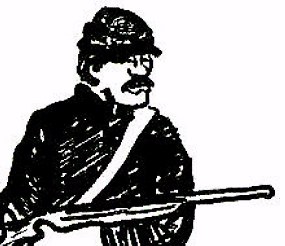
It is illustrated that Grierson was successful by purpose and that the 9th was successful by fate due to the Campaigns and Actions these two units participated in.
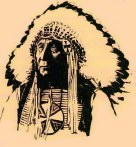 The Indian Campaigns
The Indian CampaignsThe 9th and the 10th were either the deciding factor or the sole military units in the field at the battles of Beaver Creek, Beechers Island, Cheyenne Wells, engagements against Geronimo's Band, Victoria's Apaches, the Pursuit of Cochise launched from Ft. Huachuca; and the Expeditionary Force taken into Mexico after Pancho Villa's raid on Columbus New Mexico in 1916.
When looking at the record of the 9th and 10th Cavalry heros are not hard to find; and their sacrifice is an area of American Pride. But, we should never raise one race over another for the sake of pride alone; all peoples have legitimate Heros...Let us find those Heros based on their actions, their strength of character, integrity and their honest sacrifice.
The Black Trooper of the 1860's - 1890's are such Heros.
(The above article is an unedited version of the original as it appeared in the AC Current)
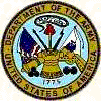
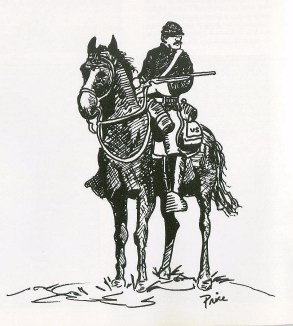
'Ever Vigilant'
10th Cavalry Trooper by Bob Price
(Felt tip on paper 5"x7" for Magazine Illustration 1979)
Gallant Troops Dedicated to Duty and Service
The Black Troopers of the 24th and 25th Infantry
9th and 10th US Cavalry
Heroes in Deed...and Glory
Willing and Loyal Men
Carrying on the Best Traditions of The US Army
Known to us Historically as
'The Buffalo Soldier'
Their Banner Never Faltered
Congressional Medal of Honor Recipients
9th Cavalry Regiment
10th Cavalry, Cuban Campaign
Sgt. Major Edward L. Baker, Jr.; Pvt. Dennis Bell, Troop H; Pvt. Fitz Lee, Troop M
EPILOG:
We should never raise one race over another for the sake of pride alone;
all peoples have legitimate Heros...
Let us find those Heros based on their actions,
their strength of character, integrity and their honest sacrifice and not have some
made up Heros forced upon us for our own good.
The Black Trooper of the 1860's - 1890's
were real Heros and they shall never be forgotten.
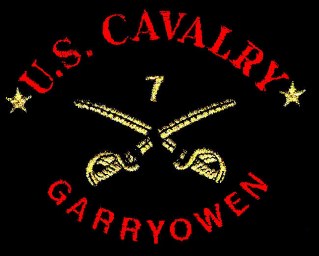
Visit our George Armstrong Custer Page
Next Page